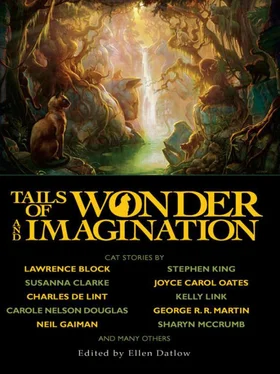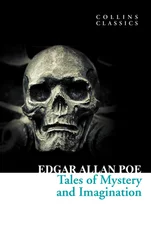Ellen Datlow - Tails of Wonder and Imagination
Здесь есть возможность читать онлайн «Ellen Datlow - Tails of Wonder and Imagination» весь текст электронной книги совершенно бесплатно (целиком полную версию без сокращений). В некоторых случаях можно слушать аудио, скачать через торрент в формате fb2 и присутствует краткое содержание. Год выпуска: 2010, ISBN: 2010, Издательство: Night Shade Books, Жанр: Фэнтези, Фантастика и фэнтези, Ужасы и Мистика, на английском языке. Описание произведения, (предисловие) а так же отзывы посетителей доступны на портале библиотеки ЛибКат.
- Название:Tails of Wonder and Imagination
- Автор:
- Издательство:Night Shade Books
- Жанр:
- Год:2010
- ISBN:978-1-59780-170-6
- Рейтинг книги:5 / 5. Голосов: 1
-
Избранное:Добавить в избранное
- Отзывы:
-
Ваша оценка:
- 100
- 1
- 2
- 3
- 4
- 5
Tails of Wonder and Imagination: краткое содержание, описание и аннотация
Предлагаем к чтению аннотацию, описание, краткое содержание или предисловие (зависит от того, что написал сам автор книги «Tails of Wonder and Imagination»). Если вы не нашли необходимую информацию о книге — напишите в комментариях, мы постараемся отыскать её.
collects the best of the last thirty years of science fiction and fantasy stories about cats from an all-star list of contributors.
Tails of Wonder and Imagination — читать онлайн бесплатно полную книгу (весь текст) целиком
Ниже представлен текст книги, разбитый по страницам. Система сохранения места последней прочитанной страницы, позволяет с удобством читать онлайн бесплатно книгу «Tails of Wonder and Imagination», без необходимости каждый раз заново искать на чём Вы остановились. Поставьте закладку, и сможете в любой момент перейти на страницу, на которой закончили чтение.
Интервал:
Закладка:
I swallowed my screams, struggling to replace them with something rational. “It’s merely a glorified piece of glass.” My voice bounced off the walls in the lonely house, hardly comforting.
I had an overpowering image of something inside me, something dark and featureless except for wide, white eyes and scrabbling claws. Get us out of here! it cried, and I obliged, seizing my coat from the closet hook and stumbling out into the wind.
I ran in the direction of town, slowing only when one of my shoes fell off and I realized how I must look. Soon, I found myself seated at a table in a diner, warming my hands in the steam from a cup of coffee, trying to convince myself that I was just being silly. I nursed the coffee as long as I could. It was dusk by the time I felt able to return home. There I found the glass cat, still waiting for me.
I turned on the radio for company and made a fire in the fireplace. Then I sat down before the box and finished unpacking it. The sculpture was as horrible as I remembered, truly ugly and disquieting. I might never have understood why Father kept it if he had not enclosed this letter of explanation, neatly handwritten on his college stationery:
To whom it may concern:
This box contains a sculpture, Cat in Glass , designed and executed by the late Alexander Chelichev. Because of Chelichev’s standing as a noted forerunner of Dadaism, an historical account of Cat’s genesis may be of interest to scholars.
I purchased Cat from the artist himself at his Zürich loft in December, 1915, two months before the violent rampage which resulted in his confinement in a hospital for the criminally insane, and well before his artistic importance was widely recognized. (For the record, the asking price was forty-eight Swiss francs, plus a good meal with wine.) It is known that Chelichev had a wife and two children elsewhere in the city at that time, though he lived with them only sporadically. The following is the artist’s statement about Cat in Glass , transcribed as accurately as possible from a conversation held with me during dinner.
“I have struggled with the devil all my life. He wants no rules. No order. His presence is everywhere in my work. I was beaten as a child, and when I became strong enough, I killed my father for it. I see you are skeptical, but it is true. Now I am a grown man and I find my father in myself. I have a wife and children, but I spend little time with them because I fear the father-devil in me. I do not beat my children. Instead I make this cat. Into the glass I have poured this madness of mine. Better there than in the eyes of my daughters.”
It is my belief that Cat in Glass was Chelichev’s last finished creation.
Sincerely, Lawrence Waters Professor of Art HistoryI closed the box, sealed it with the note inside, and spent the next two nights in a hotel, pacing the floor, sleeping little. The following Monday, Stephen took the cat to an art dealer for appraisal. He came home late that afternoon excited and full of news about the great Alexander Chelichev.
He made himself a gin and tonic as he expounded. “That glass cat is priceless, Amy. Did you realize? If your father had sold it, he’d have been independently wealthy. He never let on.”
I was putting dinner on the table. The weekend had been a terrible strain. This had been a difficult day on top of it—snowy, and the children in my school class were wild with pent-up energy. So were our daughters, Eleanor and Rose, aged seven and four respectively. I could hear them quarreling in the play room down the hall.
“Well, I’m glad to hear the horrid thing is worth something,” I said. “Why don’t we sell it and hire a maid?”
Stephen laughed as if I’d made an incredibly good joke. “A maid? You could hire a thousand maids for what that cat would bring at auction. It’s a fascinating piece with an extraordinary history. You know, the value of something like this will increase with time. I think we’ll do well to keep it awhile.”
My fingers grew suddenly icy on the hot rim of the potato bowl. “I wasn’t trying to be funny, Stephen. It’s ugly and disgusting. If I could, I would make it disappear from the face of the Earth.”
He raised his eyebrows. “What’s this? Rebellion? Look, if you really want a maid, I’ll get you one.”
“That’s not the point. I won’t have the damned thing in my house.”
“I’d rather you didn’t swear, Amelia. The children might hear.”
“I don’t care if they do.”
The whole thing degenerated from there. I tried to explain the cat’s connection with Delia’s death. But Stephen had stopped listening by then. He sulked through dinner. Eleanor and Rose argued over who got which spoonful of peas. And I struggled with a steadily growing sense of dread that seemed much too large for the facts of the matter.
When dinner was over, Stephen announced with exaggerated brightness, “Girls. We’d like your help in deciding an important question.”
“Oh goody,” said Rose.
“What is it?” said Eleanor.
“Please don’t,” I said. It was all I could do to keep from shouting.
Stephen flashed me the boyish grin with which he had originally won my heart. “Oh, come on. Try to look at it objectively. You’re just sensitive about this because of an irrational notion from your childhood. Let the girls be the judge. If they like it, why not keep it?”
I should have ended it there. I should have insisted. Hindsight is always perfect, as they say. But inside me a little seed of doubt had sprouted. Stephen was always so logical and so right, especially about financial matters. Maybe he was right about this, too.
He had brought the thing home from the appraiser without telling me. He was never above a little subterfuge if it got him his own way. Now he carried the carton in from the garage and unwrapped it in the middle of our warm, hardwood floor, with all the lights blazing. Nothing had changed. I found it as frightening as ever. I could feel cold sweat collecting on my forehead as I stared at it, all aglitter in a rainbow of refracted lamplight.
Eleanor was enthralled with it. She caught our real cat, a calico named Jelly, and held it up to the sculpture. “See, Jelly? You’ve got a handsome partner now.” But Jelly twisted and hissed in Eleanor’s arms until she let her go. Eleanor laughed and said Jelly was jealous.
Rose was almost as uncooperative as Jelly. She shrank away from the glass cat, peeking at it from between her father’s knees. But Stephen would have none of that.
“Go on, Rose,” he said. “It’s just a kitty made of glass. Touch it and see.” And he took her by the shoulders and pushed her gently toward it. She put out one hand, hesitantly, as she would have with a live cat who did not know her. I saw her finger touch a nodule of glass shards that might have been its nose. She drew back with a little yelp of pain. And that’s how it began. So innocently.
“He bit me!” she cried.
“What happened?” said Stephen. “Did you break it?” He ran to the sculpture first, the brute, to make sure she hadn’t damaged it.
She held her finger out to me. There was a tiny cut with a single drop of bright red blood oozing from it. “Mommy, it burns, it burns.” She was no longer just crying. She was screaming.
We took her into the bathroom. Stephen held her while I washed the cut and pressed a cold cloth to it. The bleeding stopped in a moment, but still she screamed. Stephen grew angry. “What’s this nonsense? It’s a scratch. Just a scratch.”
Читать дальшеИнтервал:
Закладка:
Похожие книги на «Tails of Wonder and Imagination»
Представляем Вашему вниманию похожие книги на «Tails of Wonder and Imagination» списком для выбора. Мы отобрали схожую по названию и смыслу литературу в надежде предоставить читателям больше вариантов отыскать новые, интересные, ещё непрочитанные произведения.
Обсуждение, отзывы о книге «Tails of Wonder and Imagination» и просто собственные мнения читателей. Оставьте ваши комментарии, напишите, что Вы думаете о произведении, его смысле или главных героях. Укажите что конкретно понравилось, а что нет, и почему Вы так считаете.












